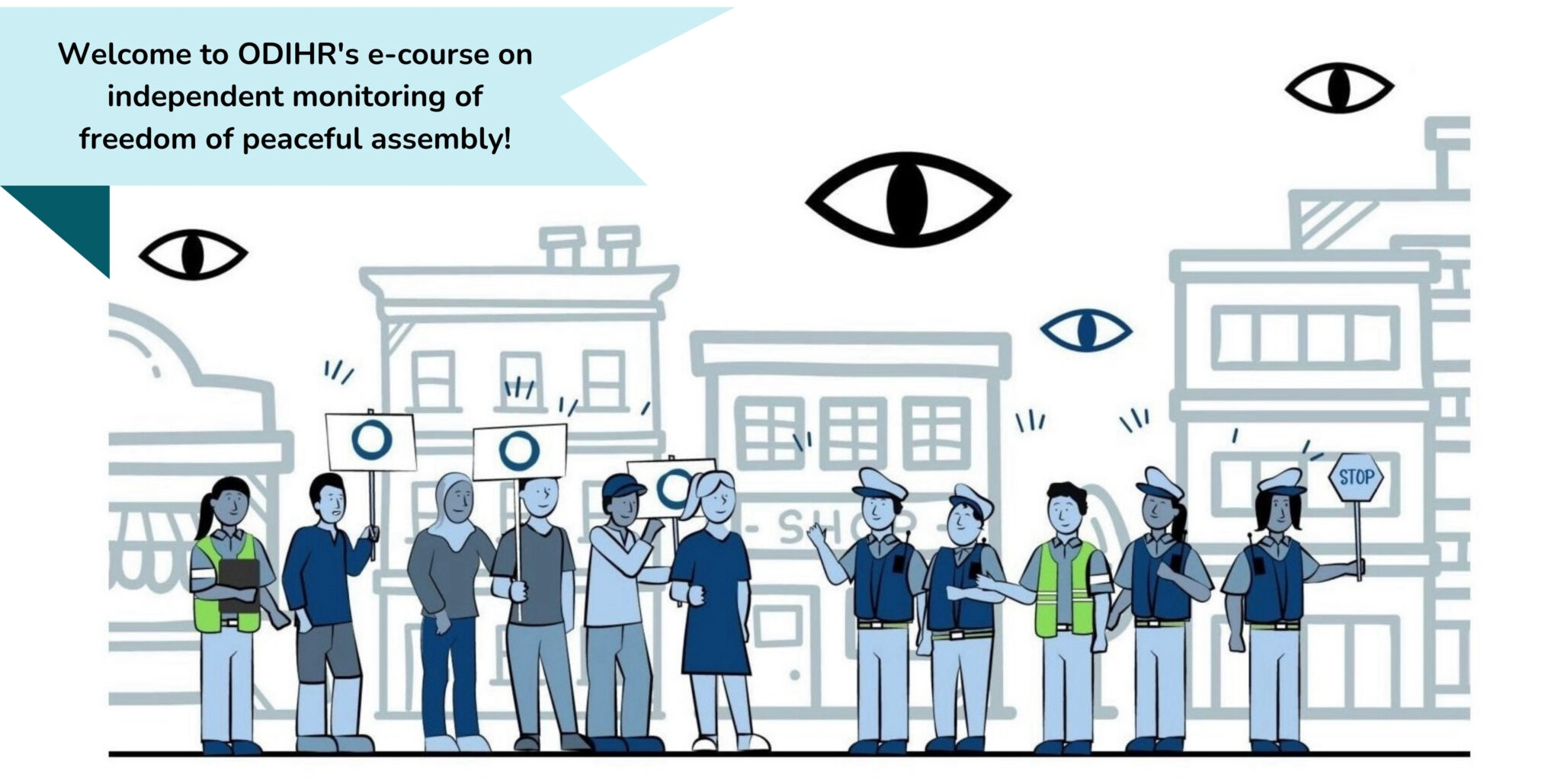This course is also available in Russian language.

The OSCE Office for Democratic Institutions and Human Rights (ODIHR) is the only inter-governmental actor engaged in independent assembly monitoring through direct observation of assemblies. Since 2011, it has consistently expanded the list of OSCE participating States where it has deployed assembly monitors.
Following ODIHR’s assembly monitoring methodology, this course will equip you with the necessary knowledge and skills to observe peaceful assemblies and assess whether they are facilitated in a human rights-compliant way.
What will I learn?
Throughout this course, you will become familiar with the key international human rights standards related to the right to freedom of peaceful assembly and understand how states can ensure and improve the facilitation of assemblies.
You will also learn about the important role of assembly monitoring in protecting human rights and achieving accountability. You will acquire knowledge regarding police equipment and tactics and the principles regulating the use of force.
Further, you will understand how to plan and prepare for an assembly monitoring exercise, how to behave during a deployment, what information to record while monitoring, how to report on your observations and how to use your monitoring findings in your human rights advocacy efforts.
Check out this animated video to learn more about this e-course and how you too can make a difference!
The content of this course has been is divided into eight modules, each covering going through different aspects of the assembly monitoring process. These are followed by a form soliciting feedback about the course and a final assessment.
Each module contains up to three video lectures, additional resources to read and explore and quizzes to help you reflect on what you have learned and dig deeper into the topic.
In each module, you will have the opportunity to learn from experienced trainers and listen to testimonies of assembly monitoring experts.
Trainers
● Aleksandar Sekulić, Human Rights Adviser at ODIHR
● Anete Erdmane, Human Rights Adviser and Monitoring and Response Co-ordinator at ODIHR
● Anja Bienert, International Expert on Police and Human Rights
● Ena Bavčić, Member of the OSCE/ODIHR Panel of Experts on Freedom of Assembly and Association
● Gary White, International Expert on Human Rights Compliant Policing of Assemblies
● Marine Constant, Human Rights Adviser and Capacity Building Co-ordinator at ODIHR
● Matthew McEvoy, Research Associate at the Omega Research Foundation
● Neil Corney, Research Associate at the Omega Research Foundation
● Orce Bonev, Human Rights Adviser at ODIHR
● Robert Podgorelec, Security Expert
Experts
● Alexandra Oancea, Assembly Monitor at ODIHR
● Ana Jabauri, Project Coordinator and Monitoring Team Lead at the Human Rights Centre in Tbilisi
● Clément Nyaletsossi Voule, United Nations Special Rapporteur on the Rights to Freedom of Assembly and Association
● Denis Shedov, Data Analyst at OVD-info
● Jocelyn Rosnick, Legal Observer at the Ohio Chapter of the National Lawyers Guild
● Rafael Ishkhanyan, Monitoring Coordinator at the Helsinki Committee of Armenia
● Tatiana Glushkova, Board Member at the “Memorial” Human Rights Defense Centre and Member of the OSCE/ODIHR Panel of Experts on Freedom of Assembly and Association
● Yevgeniy Zhovtis, Director of the Kazakhstan International Bureau for Human Rights and Rule of Law and Member of the OSCE/ODIHR Panel of Experts on Freedom of Assembly and Association
Modalities
How do I enroll?
The course is available for all and free of charge. You may access it anytime with or without registration. Registering will help you save your progress: stop at any point and resume whenever you feel like it. It will also allow you to obtain a certificate, upon completion of the course.
How do I get a certificate?
The module quizzes are compulsory but won’t affect your final grade. To complete a module you should obtain a grade of 50% or higher. These quizzes can be retaken and we encourage you to go back and refer to the videos and materials as and when you need them.
At the end of the course, and once you will have completed all module quizzes, you will need to complete a final assessment. If passed, you will receive a certificate of completion of the course.
Language and Subtitles
The language of instruction in the videos is English. Subtitles are available. To turn the subtitles on, click on the settings in the lower-right corner of a video and choose a language.
Click here to access the course in Russian.
If you’re having trouble exiting out of the log-in/registration panel, kindly zoom out to access the exit button.
Certificate Requirements
Complete the final assessment with a final grade of 75% or higher.




